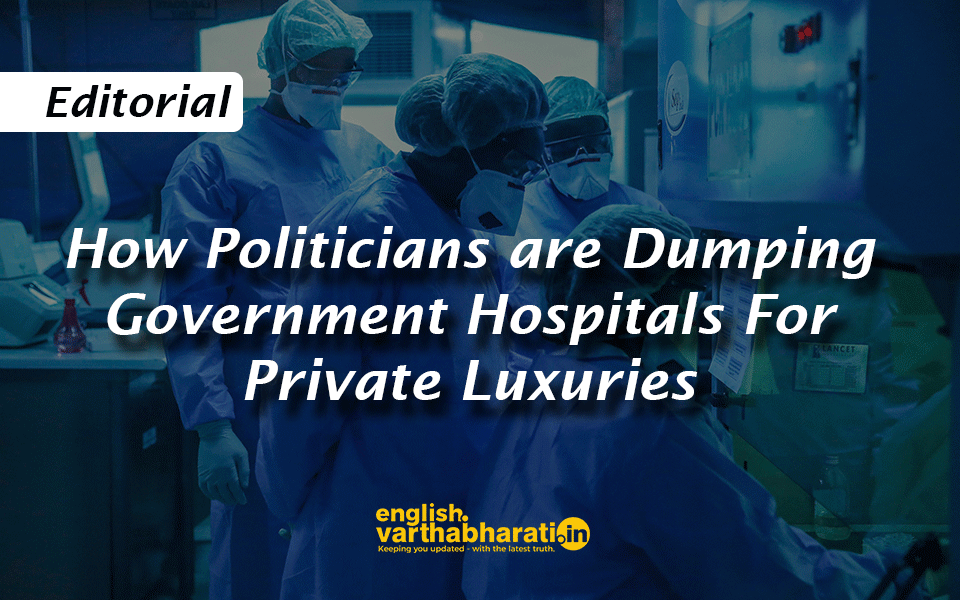A successful hotelier is making a roaring business but prefers to dine at a luxurious hotel close by for fear of risking his health if he ate at his hotel. This analogy can be applied to our leaders who are doing exactly the same as the hotelier. Several leaders including Chief Minister Yediyurappa and Leader of the Opposition Siddaramaiah are now infected with the Coronavirus. Union Home Minister Amit Shah is in quarantine. It is difficult for leaders who are in public life to escape the Coronavirus infection despite taking precautions. It is therefore inhuman to mock at them for getting infected as though it is a crime. Unlike humans, the coronavirus does not differentiate people on the basis of their social status or economic standing but considers everyone equal. Leaders seen in public life are more prone to getting infected; at the same time, it is not appropriate for political leaders to hide themselves at home wary of the virus. But what has attracted criticism are the developments that have followed.
Instead of choosing government hospitals to get quarantined, all the infected leaders have chosen private hospitals. It has been only in the recent past that private hospitals have opened their doors for quarantine purposes. As the epidemic can infect anyone, the demand has been to provide the same treatment for both the rich and the poor. The country will not be free of the Coronavirus if the rich recover from the disease and the poor remain infected. If the coronavirus gains entry to the households of the poor, it can easily infect the rich living close by. Many experts have already demanded that the treatment for the Coronavirus and the quarantine facilities should be the same for the rich and the poor. But by opting for private hospitals, our political leaders have proven that the treatment for the Coronavirus is different in government and private hospitals.
It was important that political leaders choose government hospitals for treatment not only to create awareness about the facilities in government hospitals but also to instill confidence among the people about the government hospitals. With the fear of political leaders choosing government facilities, government hospitals would have started clearing their mess and putting things in order. The act of ministers who repeatedly issue statements that ‘everything is fine in government hospitals but choose private hospitals for their treatment is similar to the analogy of the hotelier where the hotelier is indirectly accepting that the food in his hotel is not good.
After the onset of the Coronavirus, a situation has been created where people are not able to visit government hospitals to get treatment for other diseases. The media has been reporting that those infected with the Coronavirus and those with other diseases are forced to stay together in government hospitals. This mess in government hospitals is said to be the reason for the rapid spread of the Coronavirus. Such allegations gain credence when political leaders show their lack of confidence in government hospitals for their treatment. Some time ago, the judiciary had asked why government officials and people’s representatives can’t enroll their children in government schools. It is now an opportune time to ask the question more aggressively.
The quality of services in government institutions can be improved only if people’s representatives and government officials compulsorily use government schools and government hospitals. If it becomes inevitable that their children ought to study in government schools, politicians might pay attention to the state of the government schools. But our leaders don’t have the morality and ethics to send their children to schools that their governments run. Even teachers working in government schools hesitate to send their children to government schools and enroll them in private schools either openly or in secrecy. The only way that people’s representatives will pay any attention to government hospitals and government schools is when it is made inevitable for them to get treatment in government hospitals and also to enact a law to make children of their family study in government schools.
This could be beneficial in two ways. One, leaders will then pay attention to government hospitals and schools and the irregularities taking place in these institutions will reduce. This would also lead to rich politicians thinking twice before entering politics which would be the second benefit. When this happens, it could also lead to the opening of opportunities for those committed to the welfare of the country to enter the political arena. It appears that courts need to be approached to formulate relevant laws in this direction. If political leaders take exception to this, people should hit the streets and demand from their leaders answers to uncomfortable questions around their hesitation to avail themselves with government services.
Let the Truth be known. If you read VB and like VB, please be a VB Supporter and Help us deliver the Truth to one and all.
Kalaburagi: Four men have been arrested in Kalaburagi on charge of hacking a man with lethal weapons and pelting stones at him under the limits of Station Bazaar Police Station recently.
According to police sources, Anand Jalak Shinde (34), Ashitosh Jalak Shinde (30), Imran Mehboob Sheikh (28) and Sohaib Anwar Qureshi have been arrested. The men are accused of the brutal murder of Syed Mehboob, a resident of Station Bazaar Upper Line Hamalawadi in the city.
An FIR was filed by the Station Bazaar Police Station based on a complaint given by Syed Ismail, father of the deceased Syed Mehboob.
Following quick probe, the police team successfully arrested the suspects within 24 hours. The arrested men were produced in court and have been sent to judicial custody.
The City Police Commissionerate has appreciated in an official release the police team’s quick solving of the murder case and arrest of the four men accused of murdering Syed Mehboob.





